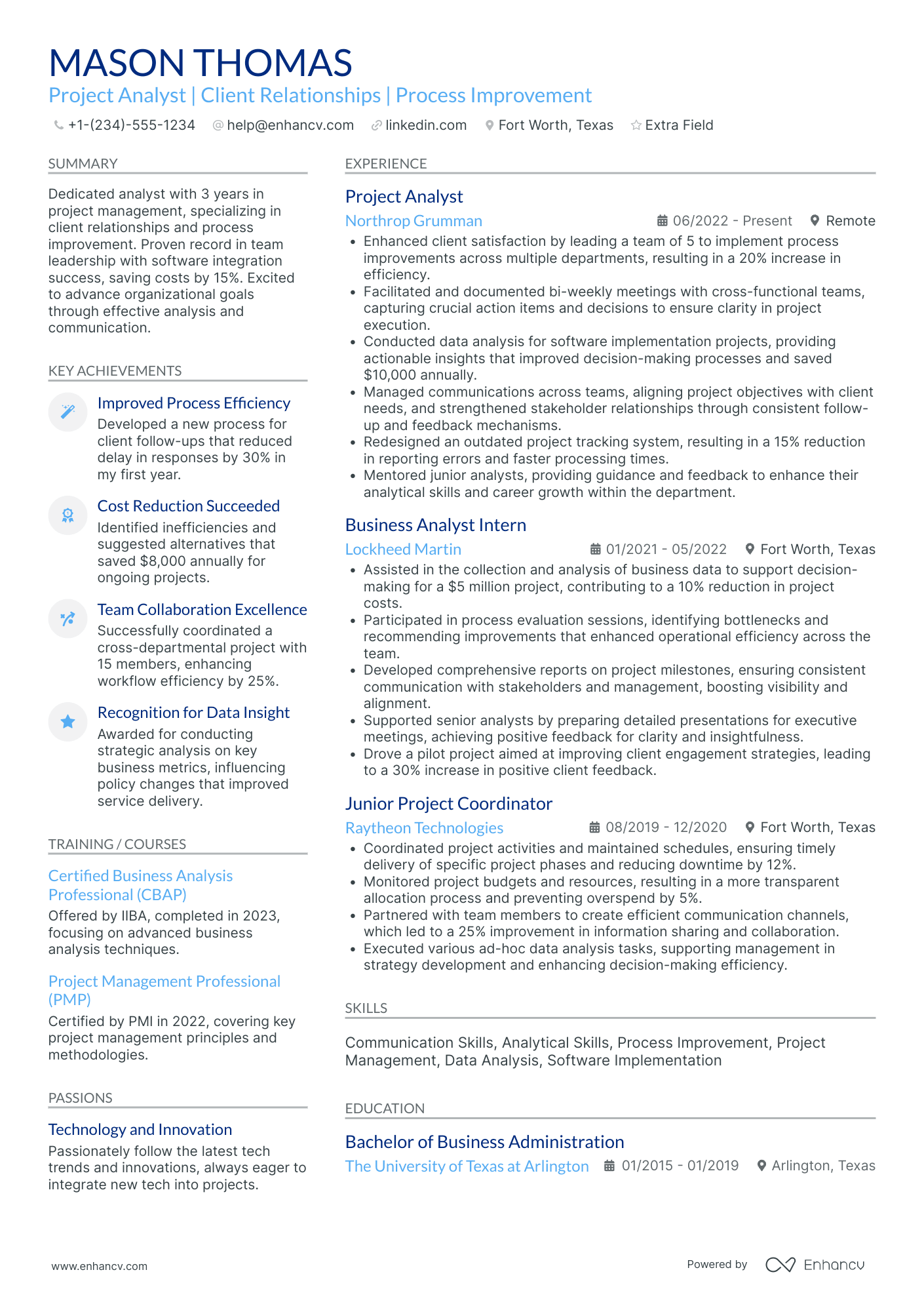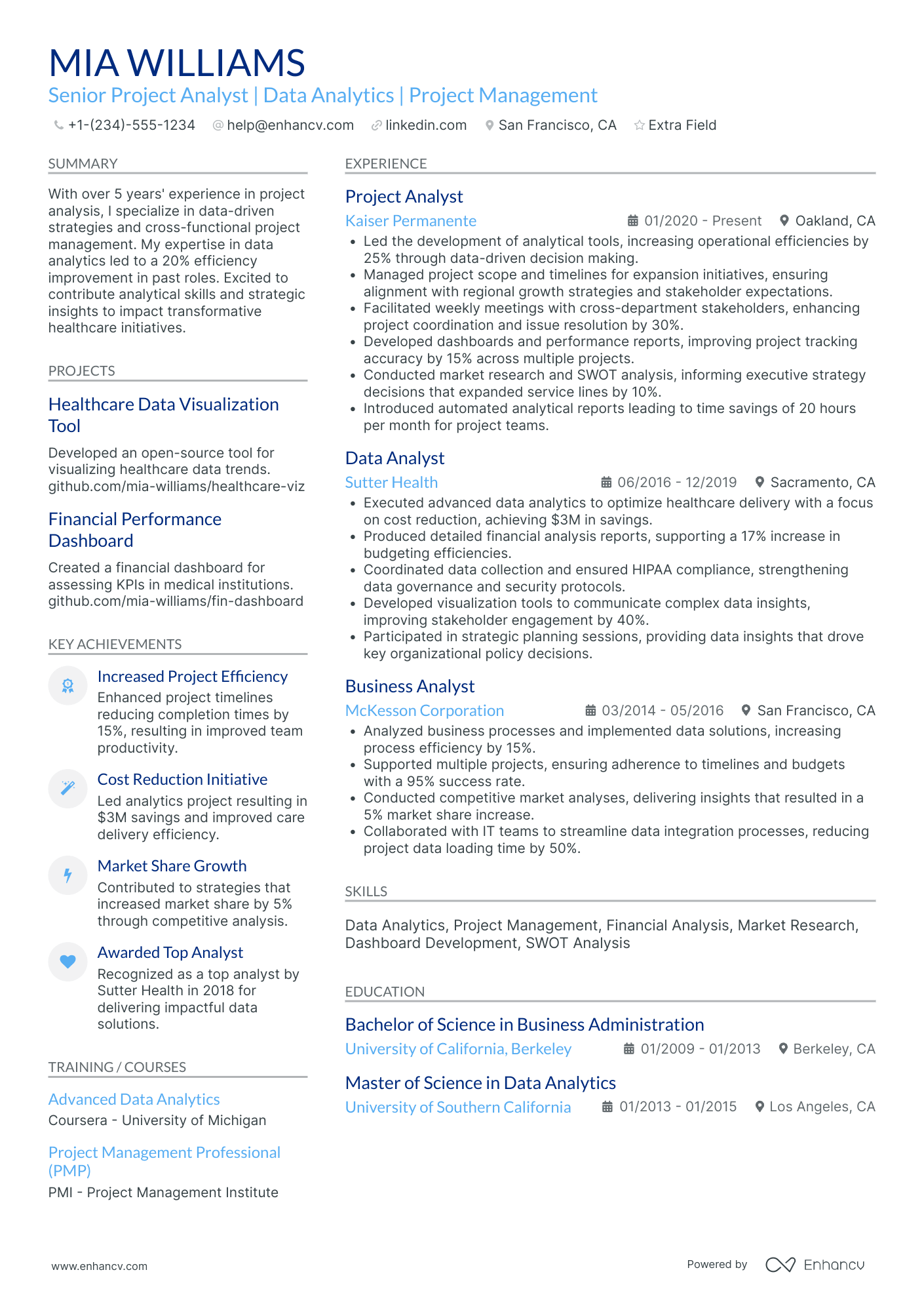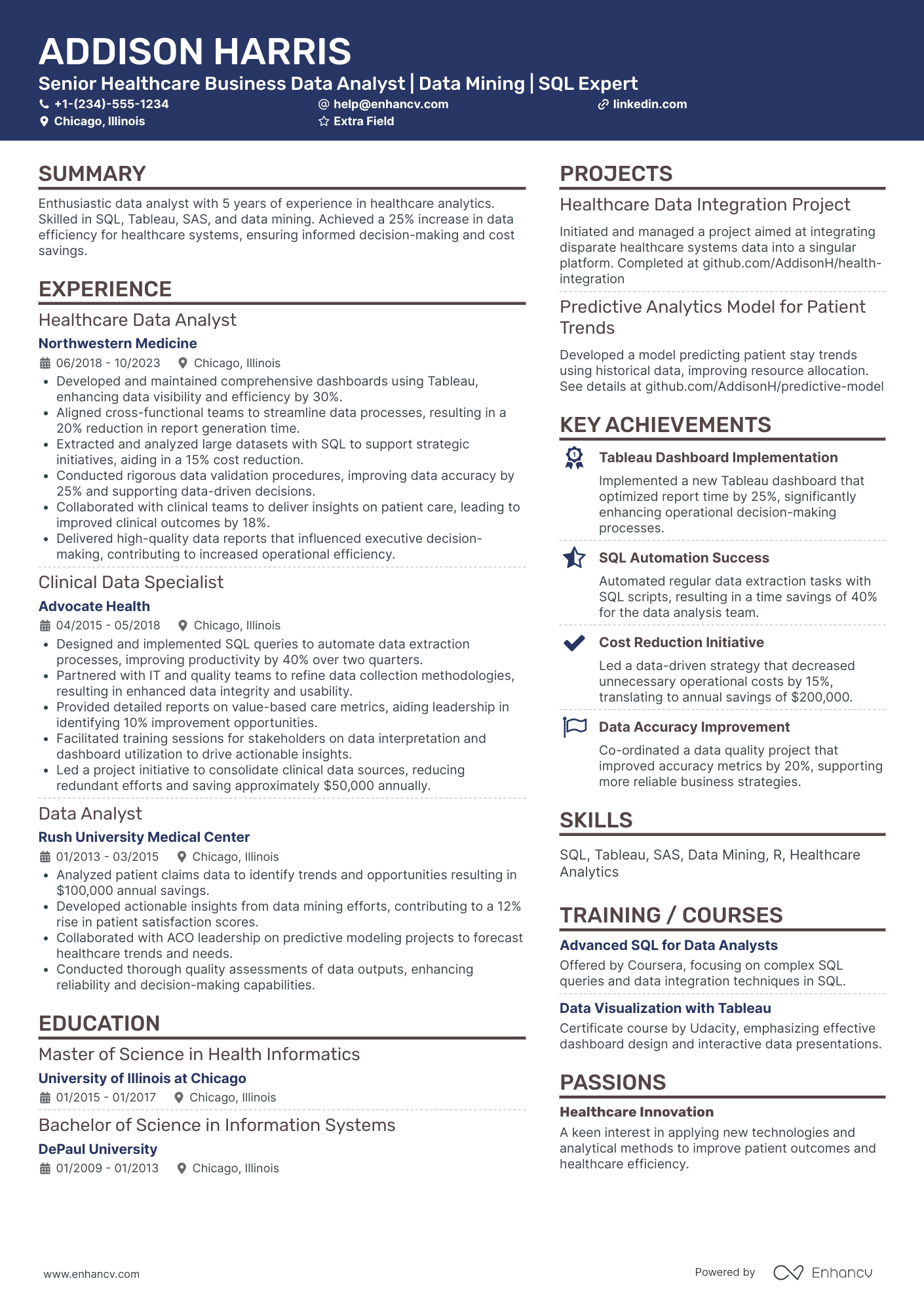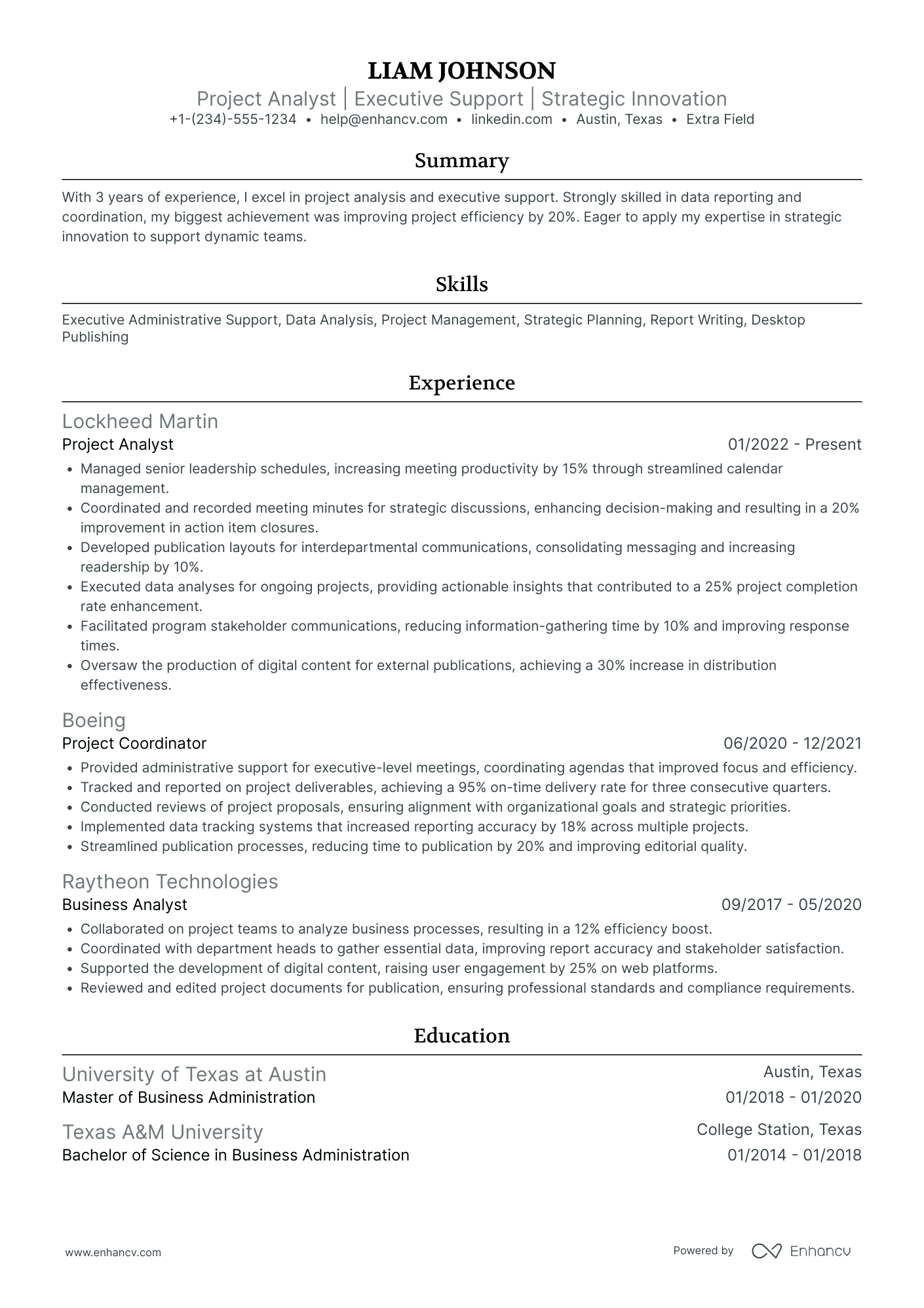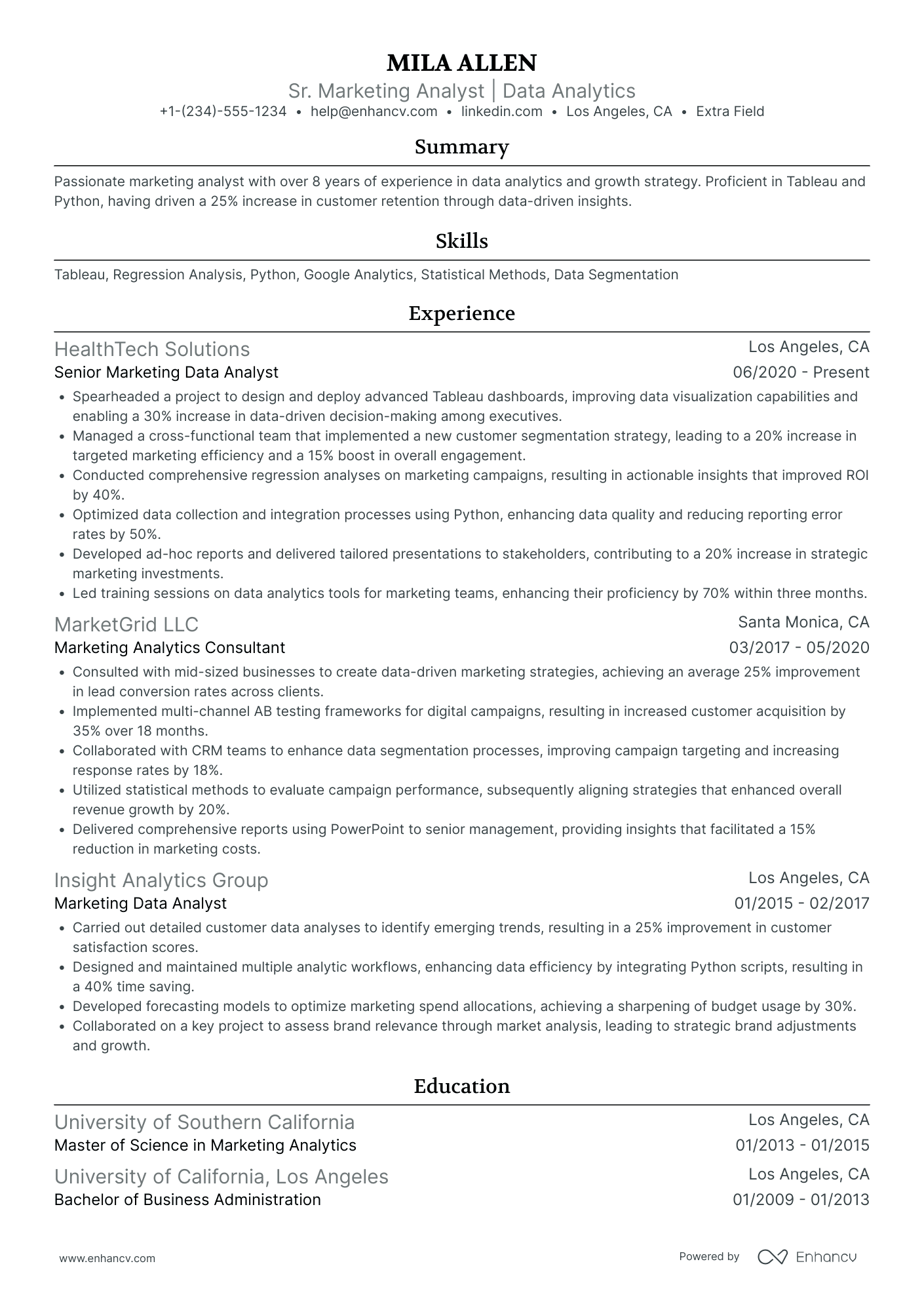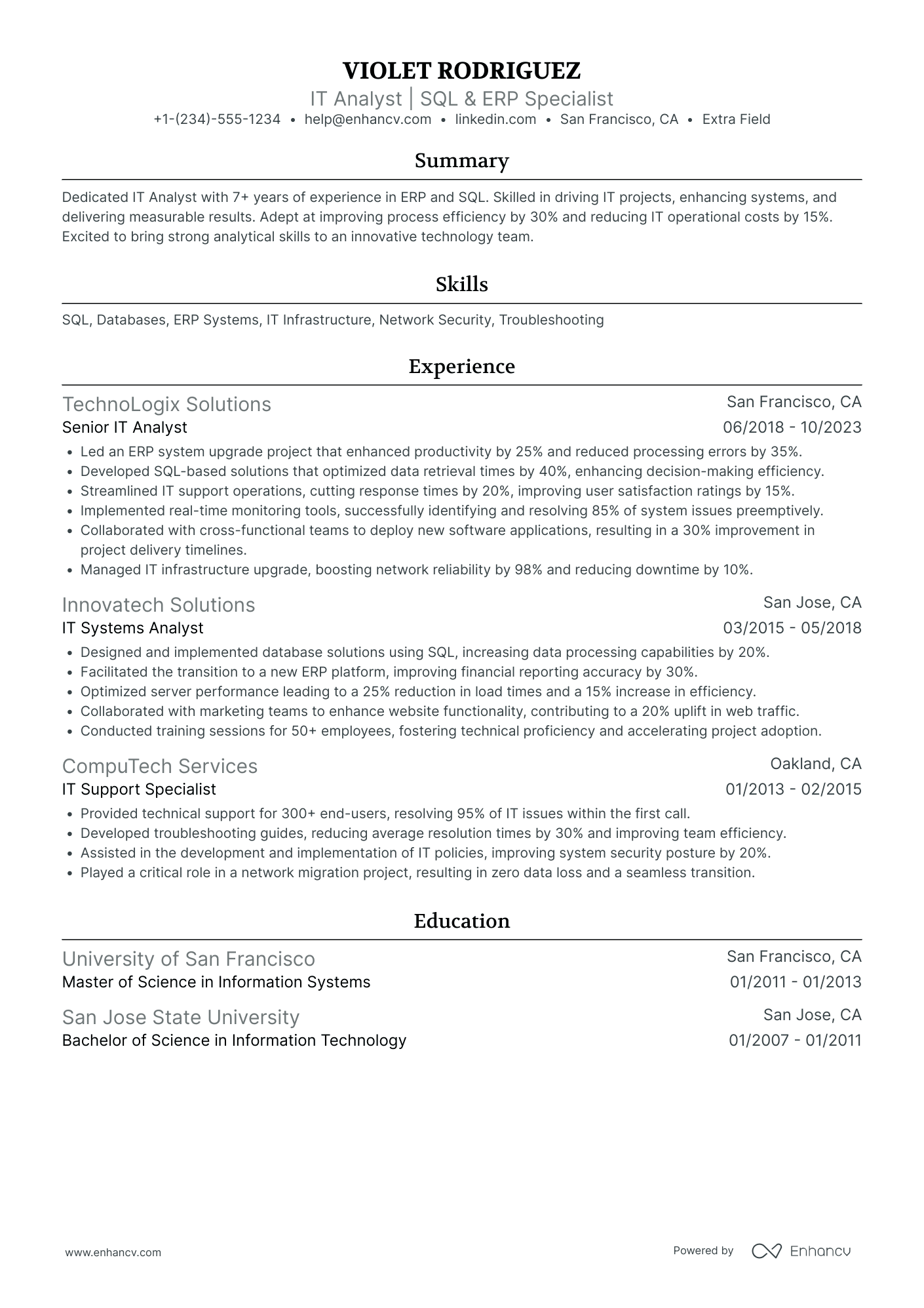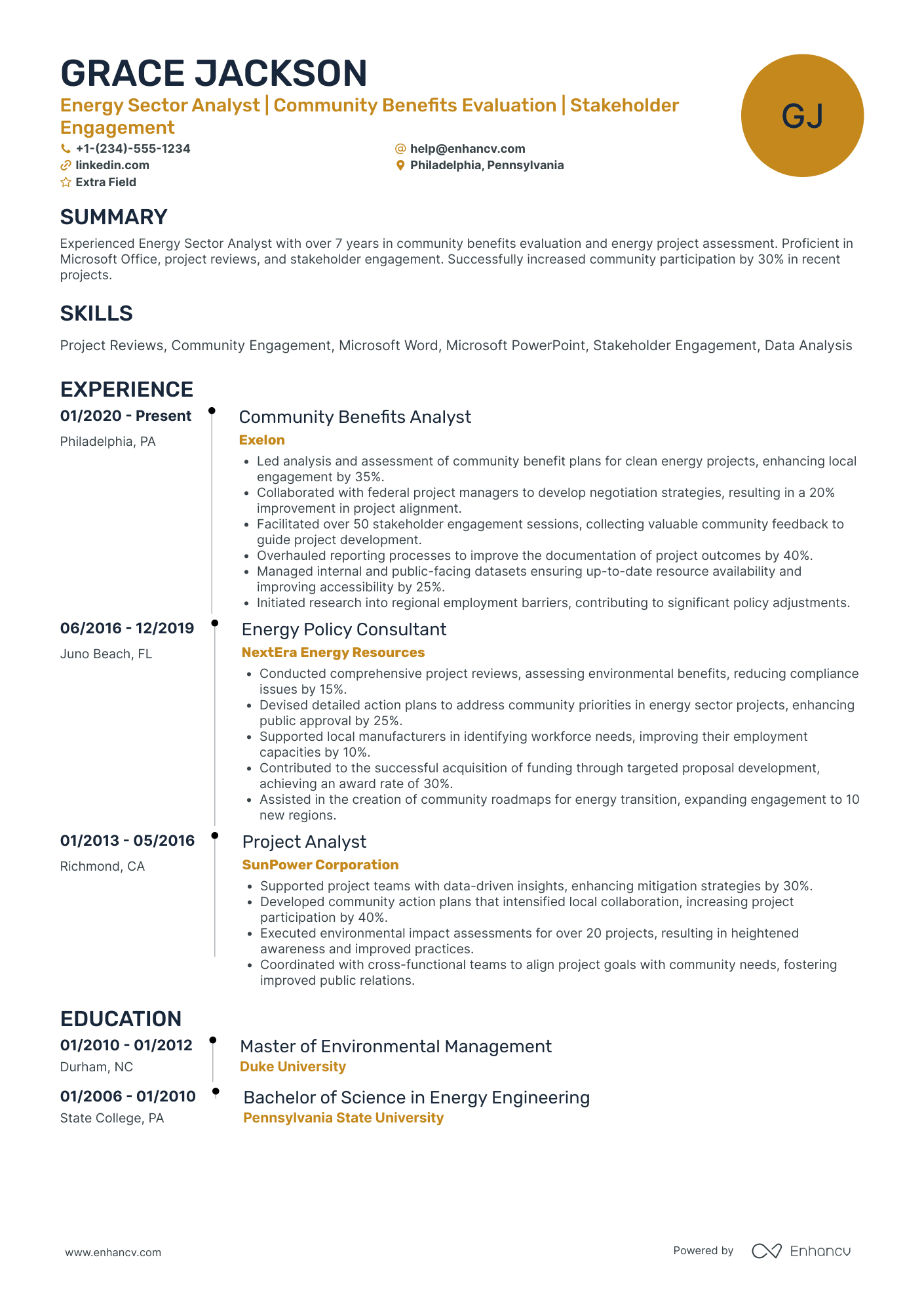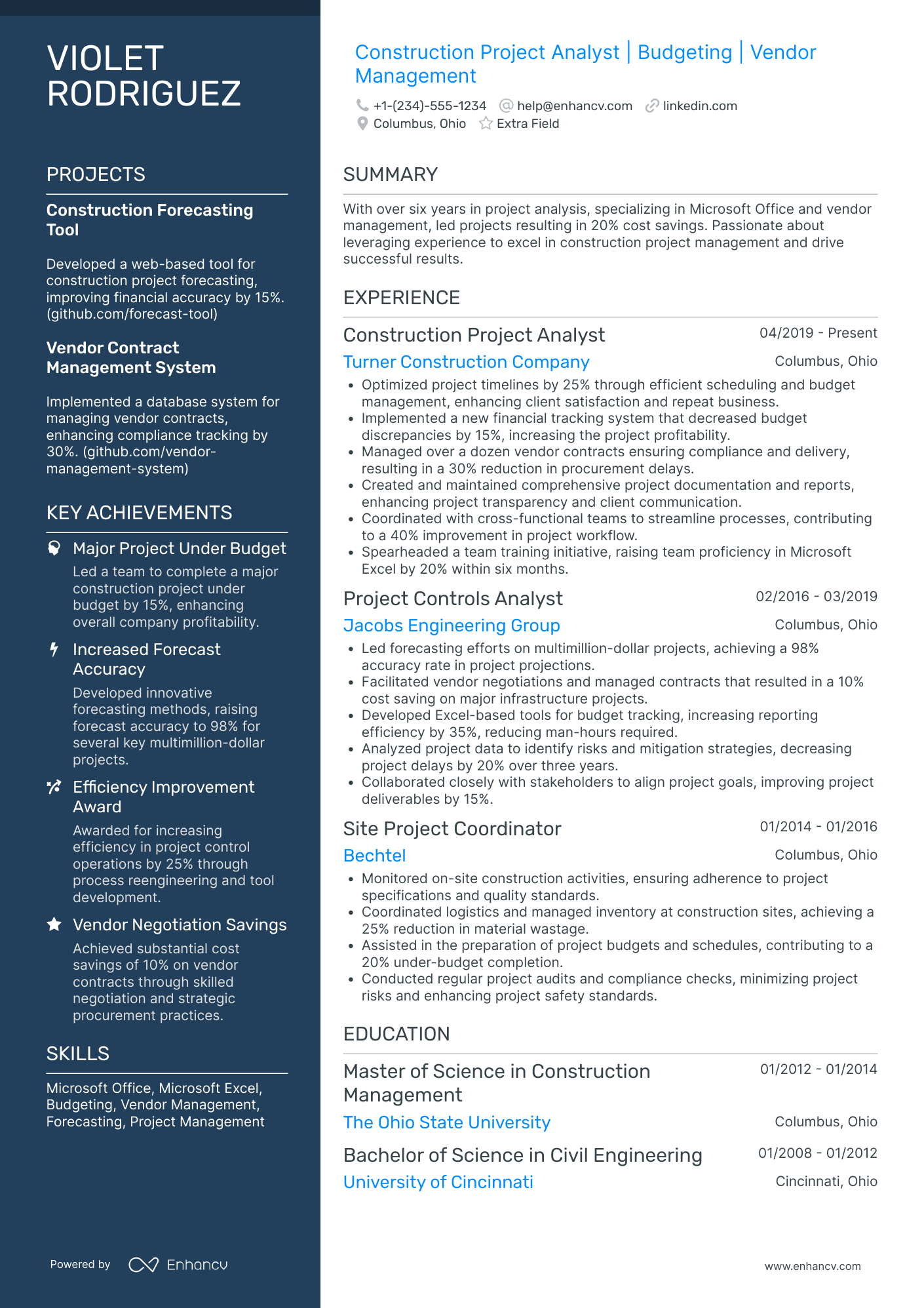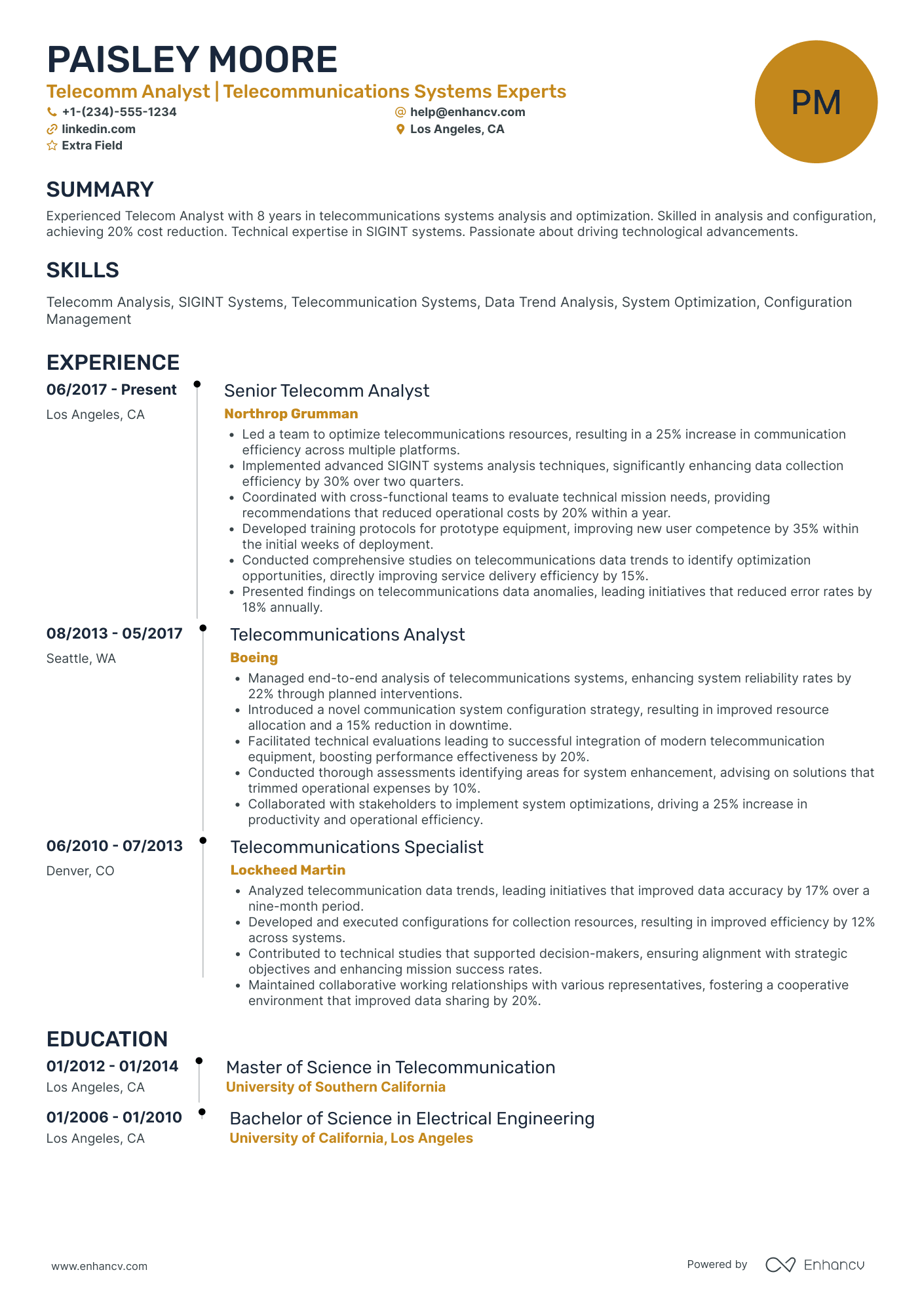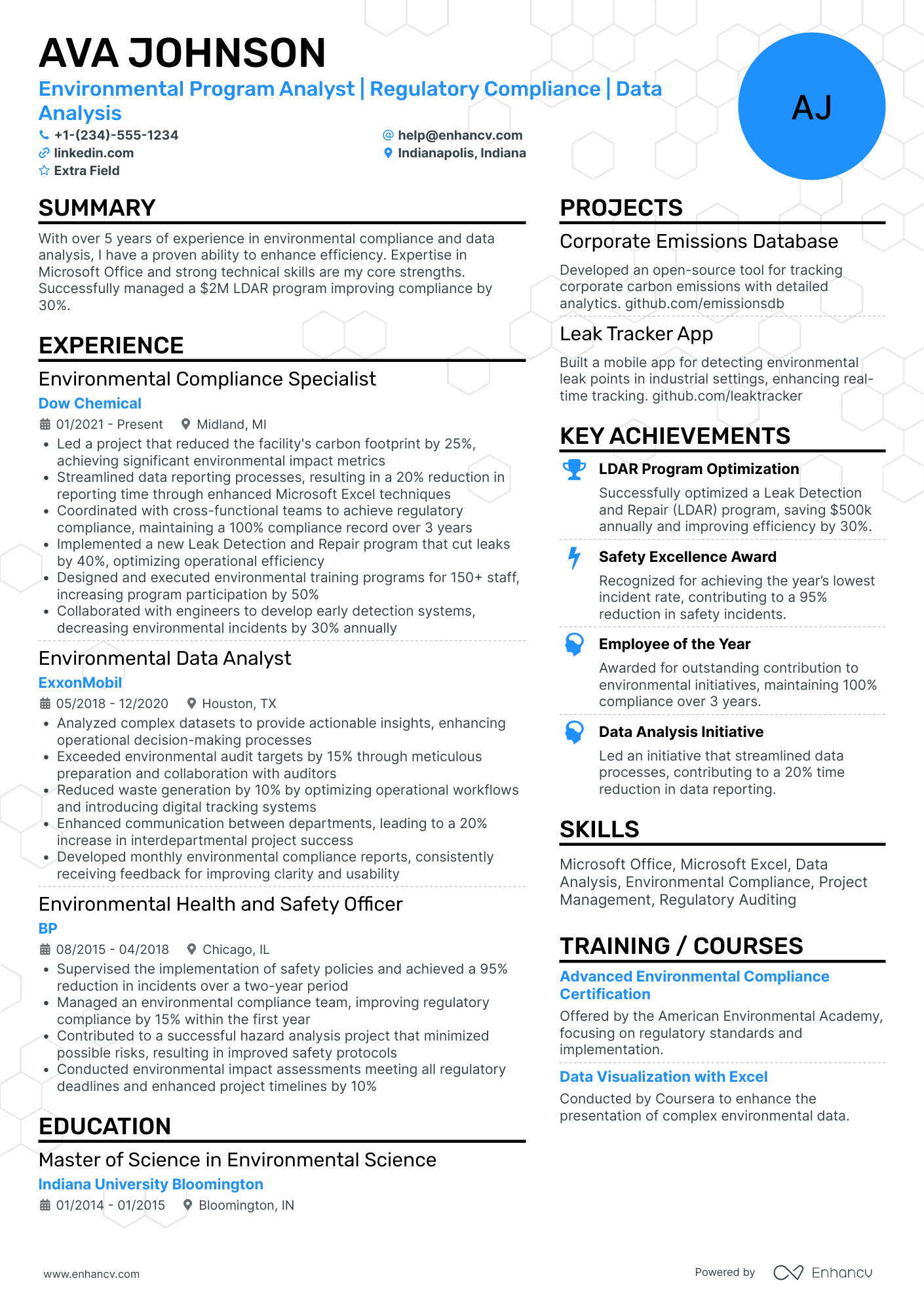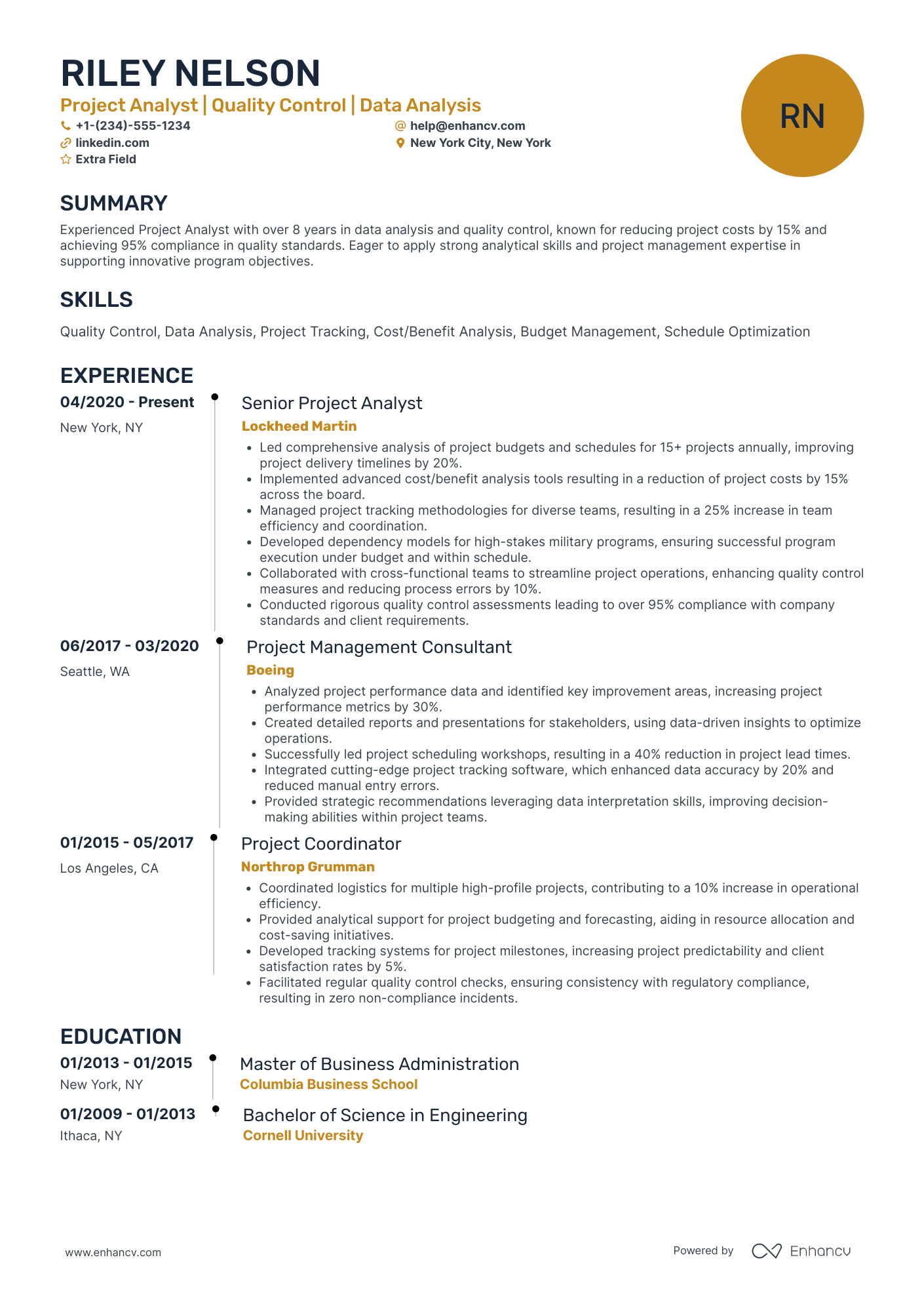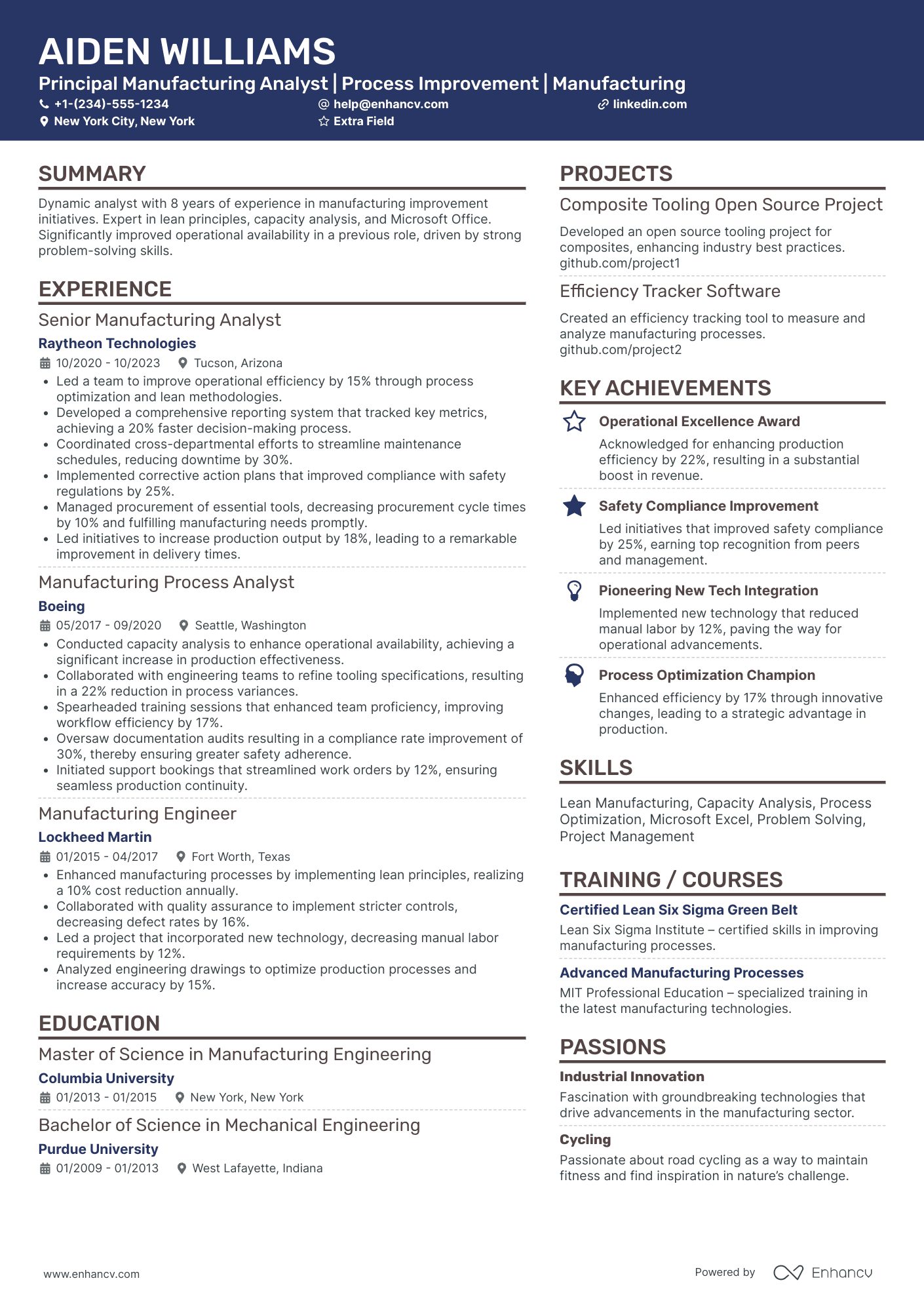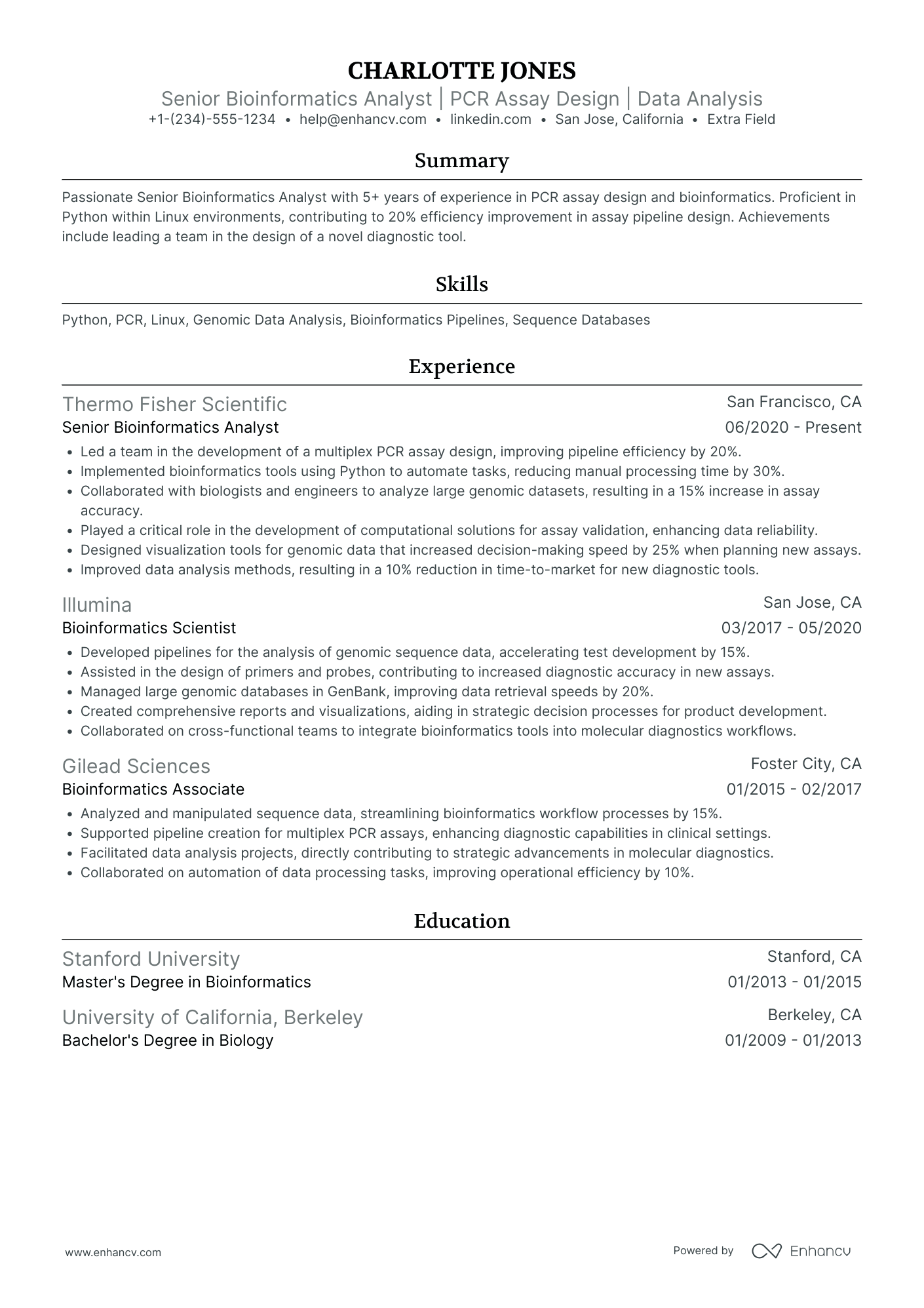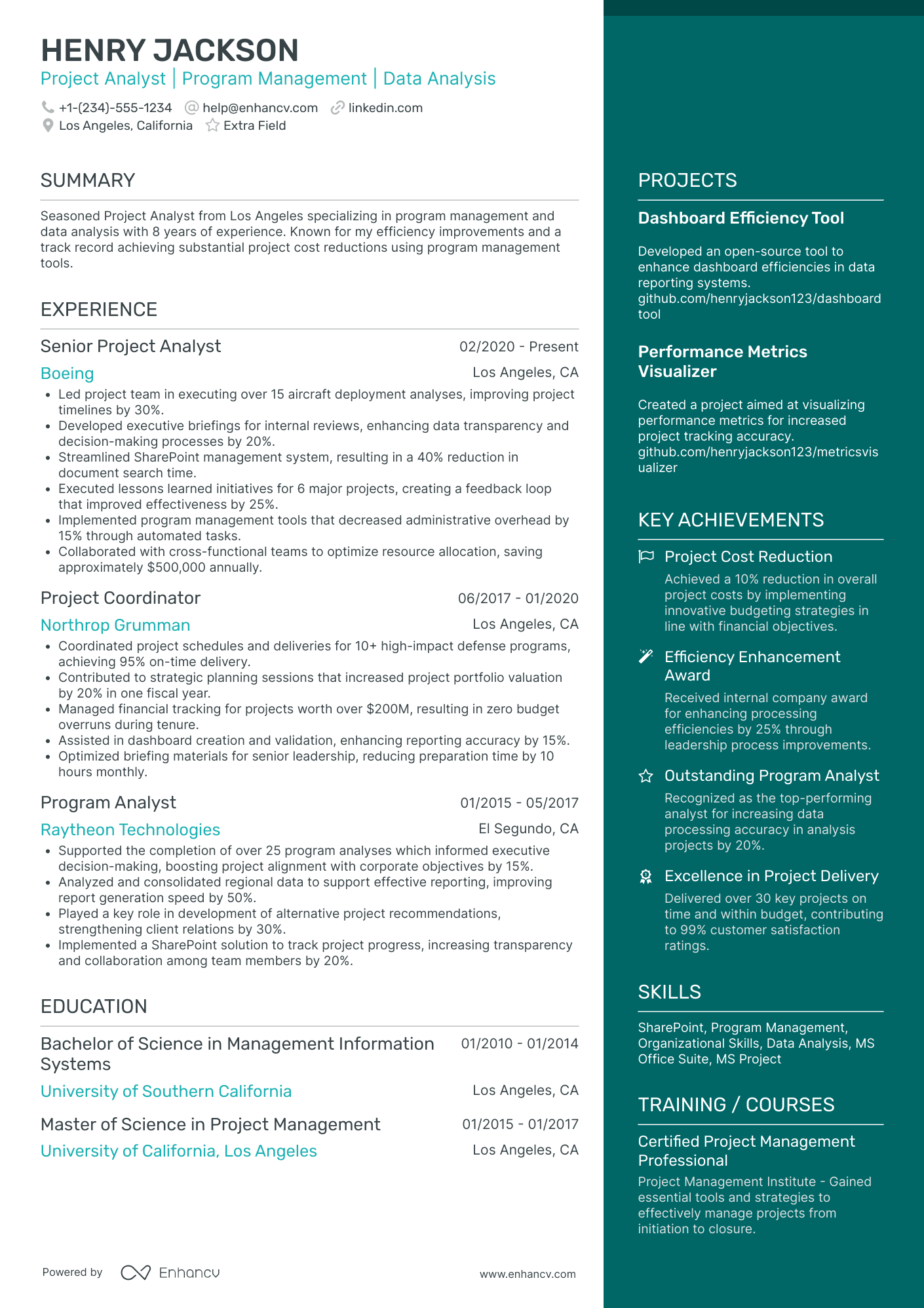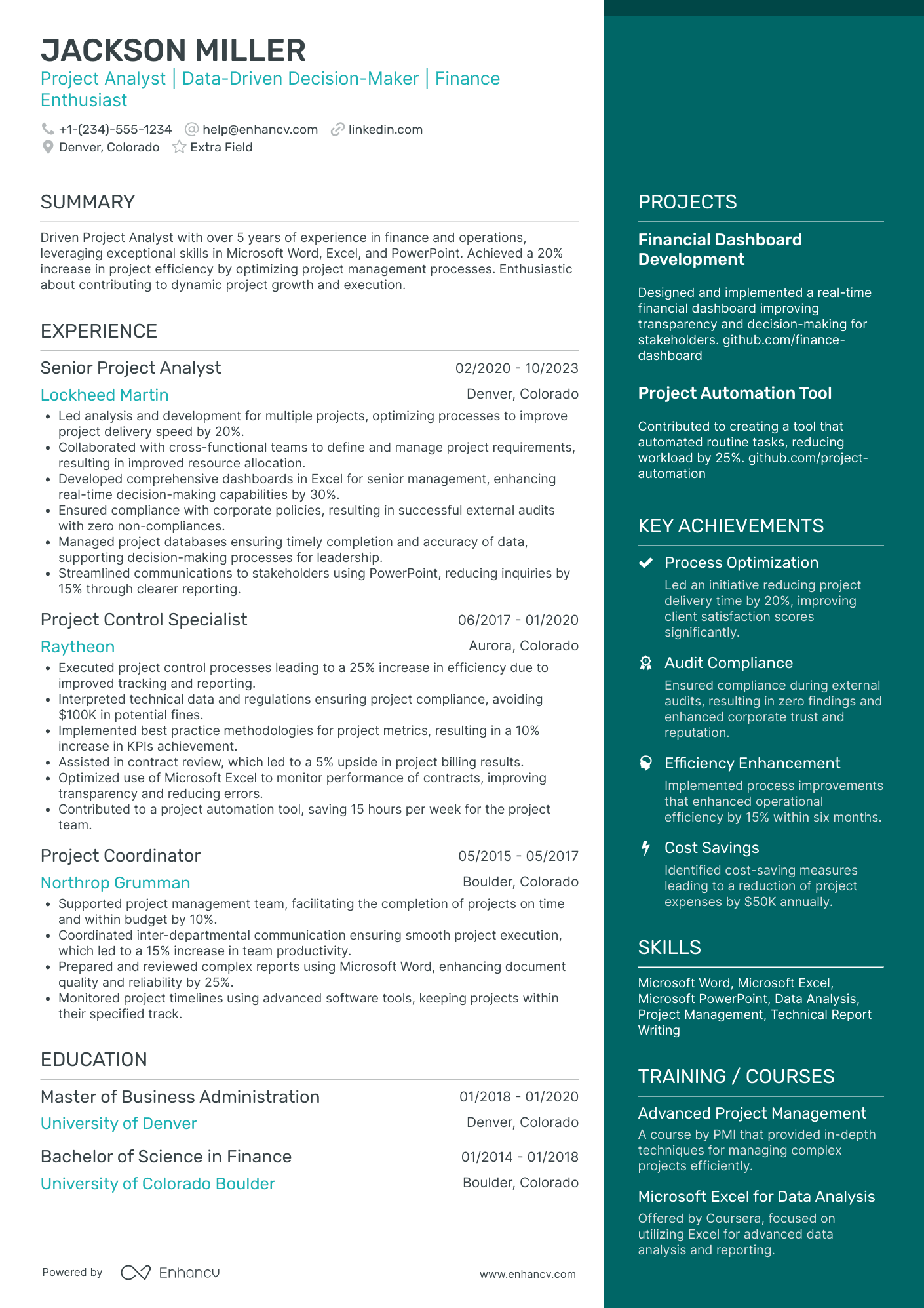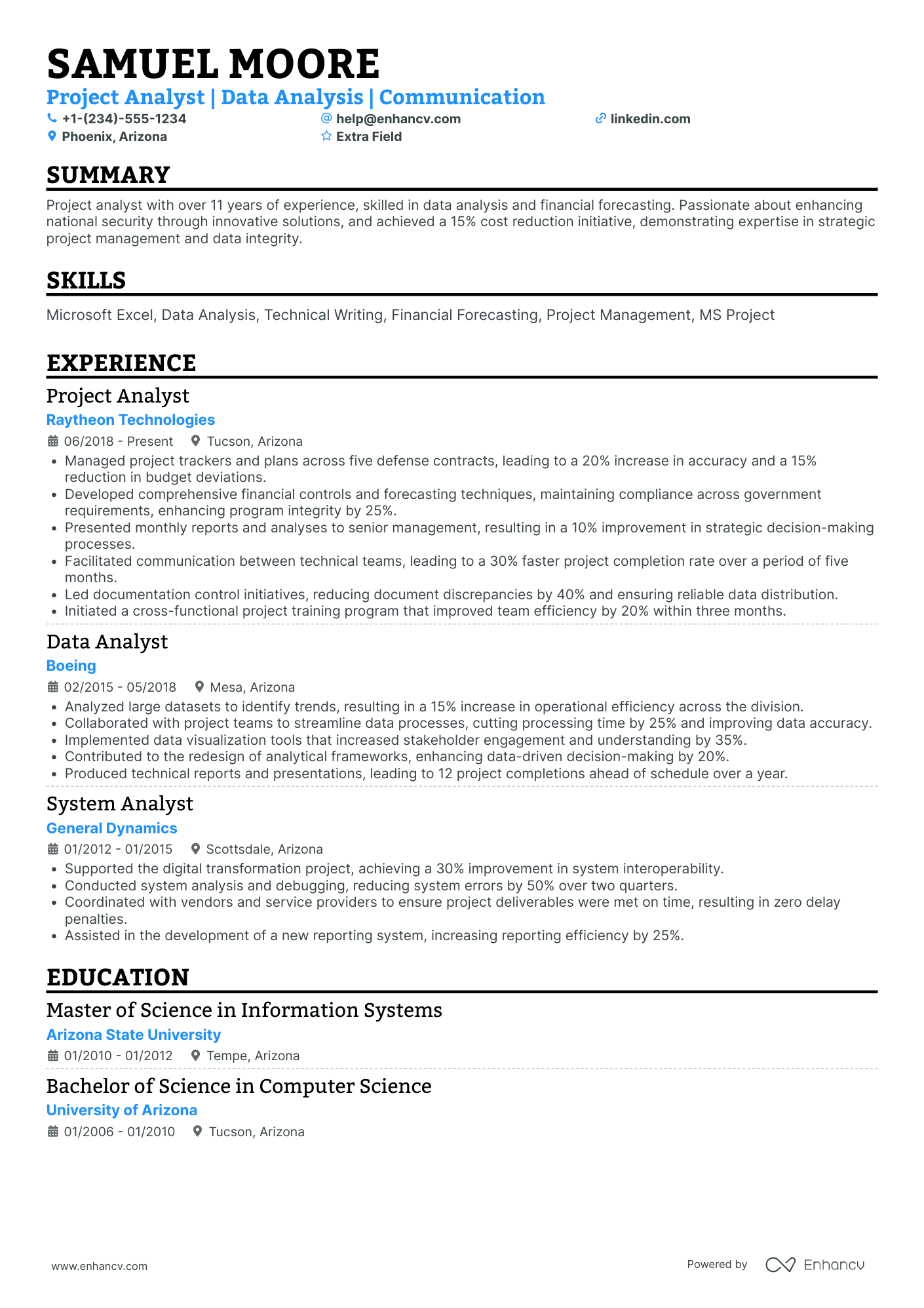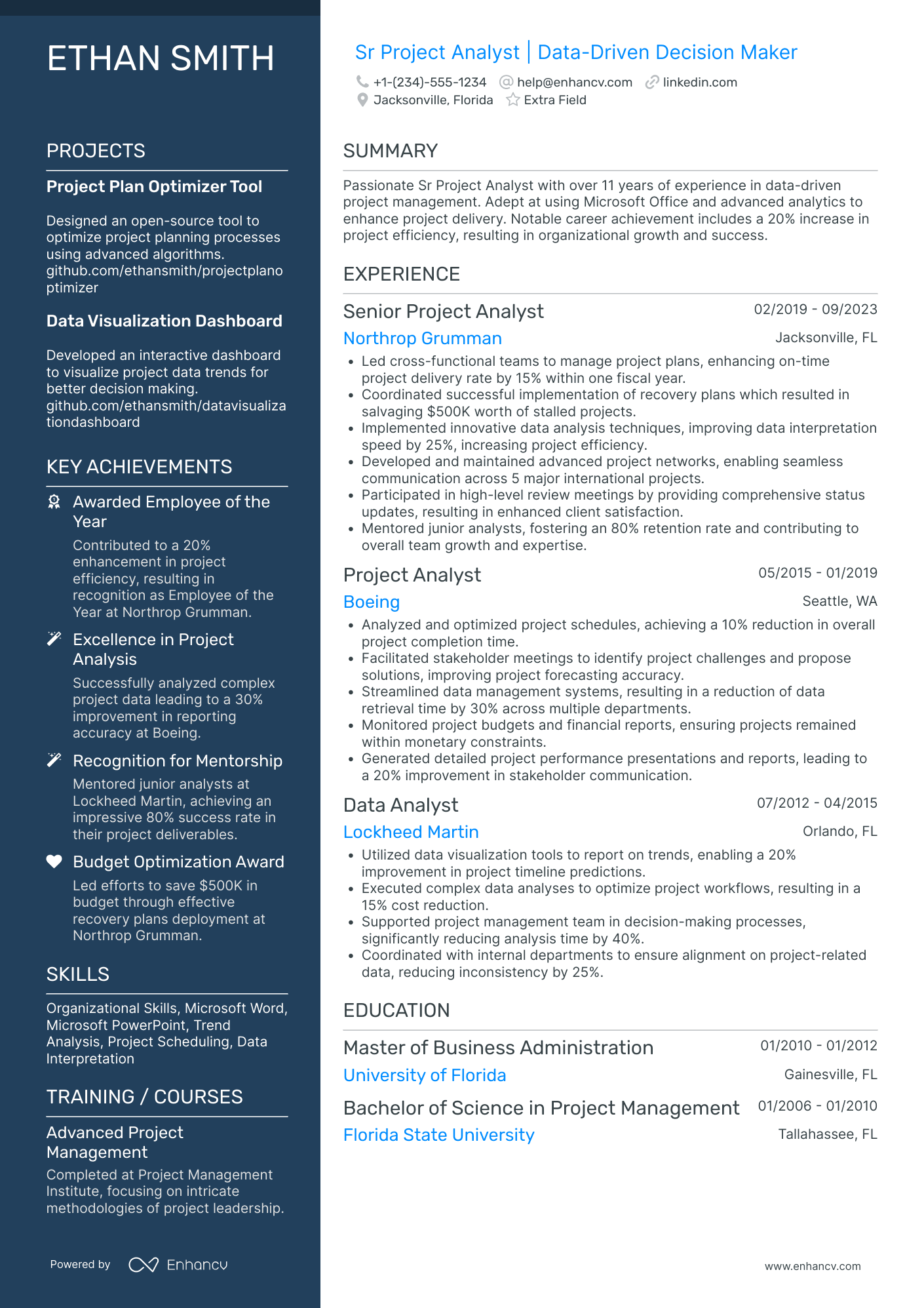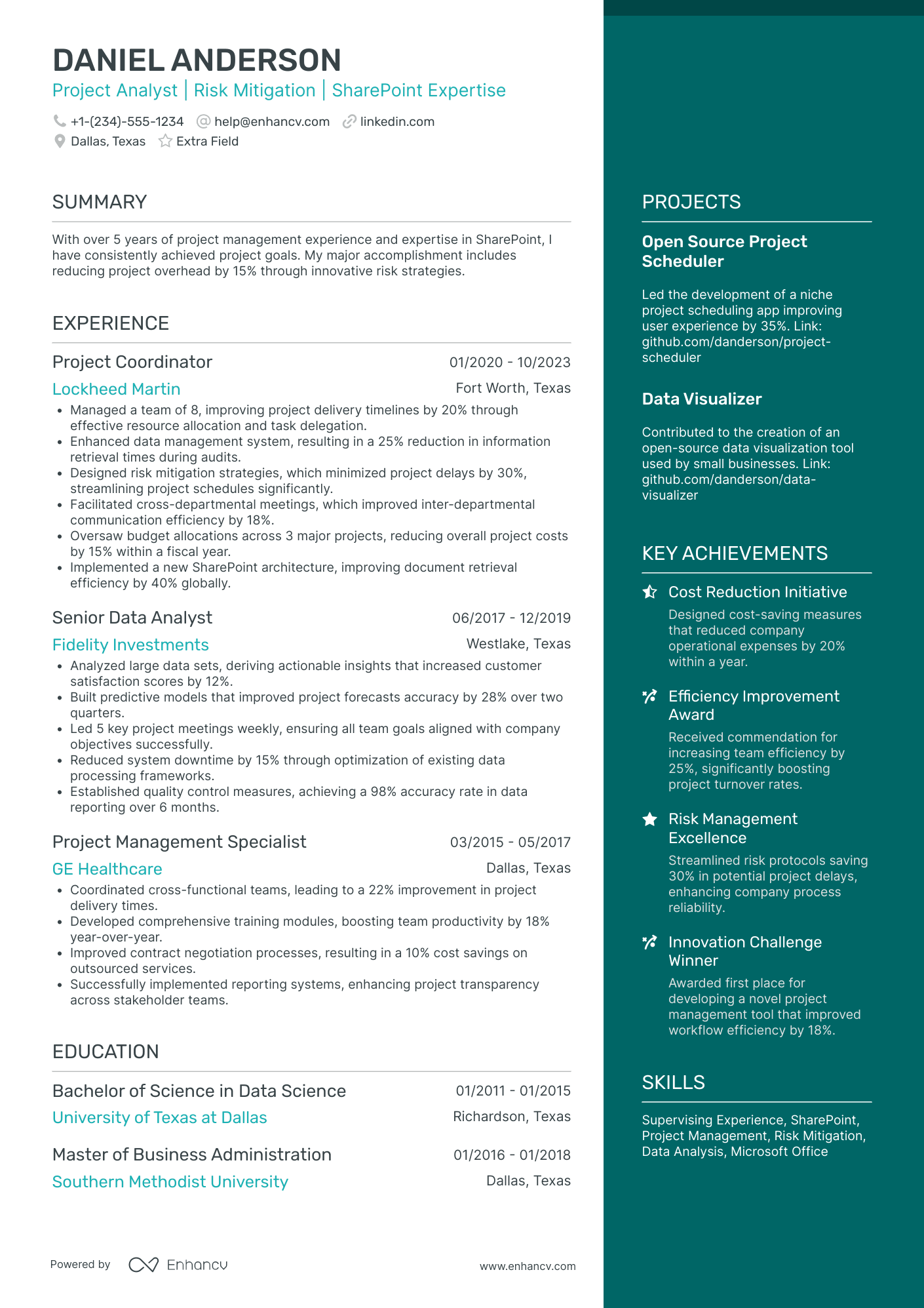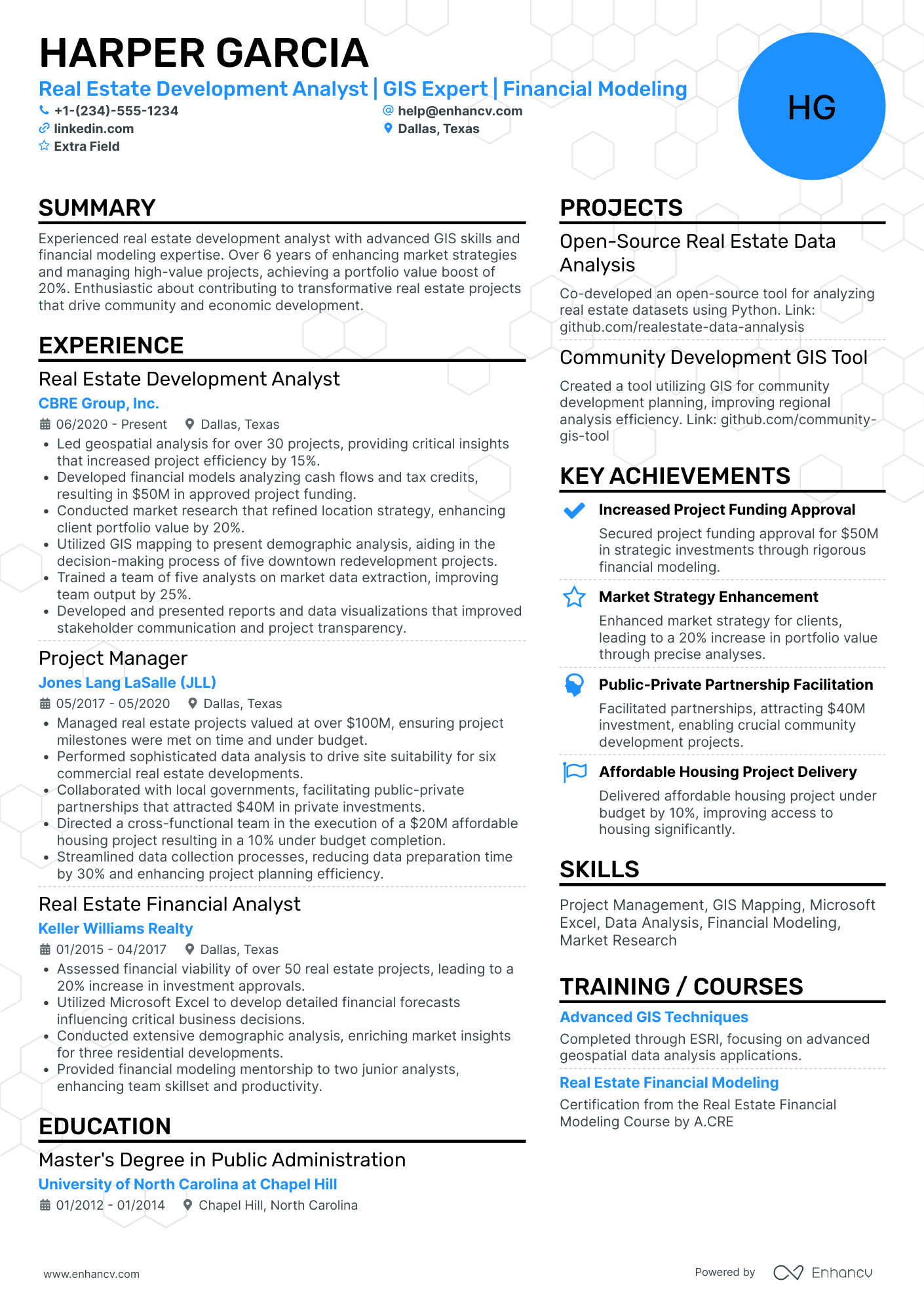Project analysts are essential for the successful development and management of new projects.
From data analysis to stakeholder communication, you do it all!
As the nuts and bolts of an organisation or company, there will be serious demand for your services.
And the job of a project analyst is pretty interesting.
You get to work a varied role in a dynamic workplace. You can show off your smarts while managing the trajectory of a project.
The way to bag a great project analyst job is to create a resume that showcases your suitability, experience and enthusiasm.
You have the ability, and now we’ll show you what to do land the job of your dreams with the perfect project analyst resume.
“Don’t imagine that just because your position is lowly that you are not expected to lead. Thought leadership; influencing, helping to build and consolidate teams are all leadership attributes that will be recognised and valued from entry.”
– Graham Ward, Former Co-Head of Goldman Sach’s European Equity Business and Adjunct Professor of Leadership at INSTEAD
This project analyst resume guide will show you:
- 8+ samples and examples of project analyst resumes
- The right experience you need to include to attract hiring managers
- Hard skills you need to get hired
- Soft skills that set you apart from other candidates
- How to create interesting visual layouts
- Project analyst qualifications and certifications
Your goal is to leave the hiring manager wanting to:
- Read your whole resume
- Talk to you more about the role
- Hire you
Looking for related resumes?
How to write a project analyst resume
You are the meticulous and data-driven mind that manages the moving parts of a project.
Your resume illustrates how you have achieved this before.
Project analyst jobs require data analysis and administrative skills.
Successful applicants have resumes that merge IT and data management skills with a range of soft skills—more on that later.
Include technical skills that show your suitability for the role:
- You can use basic documentation software such as Excel
- You can use project management software such as JIRA
- You can use diagramming software like Microsoft Visio
Here's what a hiring manager will look for in your resume:
- Do you have sound business knowledge?
- Are you able to collaborate at all levels?
- Can you juggle multiple projects at once?
- Are you comfortable using software programs to process and interpret data?
The most important aspects of a project analyst resume:
- Resume header that shows your eligibility and professionalism
- Resume summary that showcases your suitability
- Resume experience that shows you will be an asset to the company
- Hard skills that show your technical prowess
- Soft skills that show your ability to liaise and collaborate
- Project analyst education and certifications
How to create a striking project analyst resume header
Your project analyst resume header is your first introduction to the hiring manager. It’s important, so make sure it paints you in the best light.
You’re applying to work as a senior project analyst in the Financial Operations department.
Your header looks like this:
This needs a couple edits. Here’s why:
- It is not catered to the job you’re applying for, and doesn’t note your entry level
- It doesn’t come across as a professional profile
Make sure you introduce yourself as a capable and experienced professional:
This is much better as it:
- Immediately shows you are qualified for the job as a Senior project analyst
- It shows you have experience in financial operations (you have crafted your resume around the job)
- Provides a link to a professional website. Here, reviewers can have a more in depth look at the projects you have been involved with and what you have achieved
If you don't have a professional website, make sure to link to your LinkedIn account, at least.
Now the next step, an eye-catching layout…
How to choose the right layout your project analyst resume
When designing your layout, you should make sure your resume is easy to read and understand.
But, don’t shy away from getting creative.
With so many applicants, employers look for resumes that are a little bit different.
Below are some layouts that will catch the reviewer’s eye:
3 Ideas to Make Your Resume Design Memorable
- Use an infographic to symbolise your analytical thinking (charts and percentages)
- Incorporate geometric shapes (squares, rectangles, solid/dashed lines) to emphasise sections of your resume
- Coordinate colours to create a methodical and ordered visual theme
An extra tip is to keep your resume to one page unless you have additional and relevant experience.
Research, data collection and data analysis skills are essential on a project analyst resume
As a project manager’s second-in-command, the reviewer needs to know that you can take the initiative when managing projects. They also need to know you can effectively apply your data analysis to define strategies for technical solutions.
Remember, data analysis informs the development and progression of a company’s project, so make sure you know your stuff!
Show the reviewer how you will be an asset to the company, through optimising efficiency.
In your resume you can do this by:
- Writing about successful projects you played a key part in shaping and developing
- Referencing how your quality data analysis positively contributed to strategic decision making
- Explaining how you enhanced project performance by managing operational efficiencies
Integrate these examples into your professional summary and experience section.
We’ll go through those both now.
Writing a comprehensive project analyst resume summary
When writing your professional summary, you want to make a good first impression.
No waffle. No nonsense. Be concise and impress.
In one or two sentences tell the employer, who you are and what you do. Keep it brief but enthusiastic.
This section must showcase your experience and qualifications and show the employer they don’t want to miss out.
Optimize your resume summary and objective for ATS
Drop your resume here or choose a file.
PDF & DOCX only. Max 2MB file size.
3 project analyst Resume Samples - Summary
Here are some samples of project analyst resume summary sections:
This summary does not fit the bill. Here’s why:
- It contains minimal information about your experience
- It appears vague and doesn’t identify your strengths
- It doesn’t show your expertise in software and data analysis
Write a summary that convinces the hiring manager that they should hire you:
This immediately stands out. This is because:
- It shows you are qualified for the job and states your seniority
- It showcases your soft and hard skills
- It presents you as a competent and professional candidate
This next sample shows summary sections for a more senior project analyst:
This summary doesn’t sell you as a senior project analyst. Here’s why:
- It is hectic and lacks direction
- It uses first personal pronouns which come across as unprofessional
- It doesn’t demonstrate your software knowledge or your technical ability
The section below corrects these mistakes:
This summary alternatively, will get the reviewers attention:
- While short, it is succinct
- It highlights your achievements and experience
- It shows you have relevant certification
- It specifies how many years’ experience you have in that position
Pro tip
Make your summary engaging enough that the reviewer will want to read on. Provide a snippet of your achievements and throw in some percentages to tantalise them. Develop on these examples in your experience section.
Listing the right experience for your project analyst resume
Your experience section should explain what you have accomplished and the responsibilities you have had. Find a way to relate this to the job you are applying for.
This section is important, so make sure you use it to emphasise your suitability for the role.
Describe the documentation and project management software you used and your level of expertise. Write about the data analysis you performed, and how your critical thinking achieved this.
This section of your project analyst resume should focus on the following things:
- What you’ve achieved
- How you achieved it
- The results it produced
- Your impact on the company Try to avoid vagueness, instead provide facts and figures, you are an analyst after all:
2 project analyst resume experience samples
- •Analysed data and reported on findings.
- •Dealt with stakeholders by phone, email and letter.
- •Monitored and completed monthly and annual administrative tasks.
- •Delivered project deliverables in a timely manner.
These entries will leave the hiring manager thinking “and…”. This is why:
- They don’t go into detail about what you did or achieved
- The experience covered doesn’t relate specifically to the job
- The responses are completely anecdotal, with no facts, figures or software used.
This next section provides more depth and specificity:
- •Analysed data through spreadsheet manipulation, identifying irregularities and rectifying them.
- •Devalued and revalued pension benefit data both via spreadsheets and manually in order to identify any payment errors and reporting to clients to identify solutions.
- •Aided senior staff and management with complete project scope and costing of projects at conception to ensure that costs were adhered to.
- •Recommended new procedures and organisational changes based off data collection, which optimised efficiency by 15%.
This section is much better, as it:
- Describes the scope of your responsibilities
- States your specific role and elaborates on that with related examples
- Shows the effect of what you did and what impact this had When writing this section, make sure your experience relates to the responsibilities in the job description.
One way to ensure that you hit these points is to incorporate keywords and skills from the job description in your experience section.
How to describe the duties of a project analyst
Below are some of the duties performed by project analysts to consider when writing your resume. It is important that you incorporate them into your experience, education and skills sections:
- Performed schedule variance analysis and cost variance analysis, and implemented corrective action
- Contributed to project planning, budgeting and overall strategy
- Analysed project data and produced insights to optimise performance
- Provided operational support such as liaising with stakeholders
- Generated project documentation
- Assisted with project coordination for large and complex projects
One way to give your novice resume a boost, or fill gaps, is to elaborate on your previous experience and education:
- Show how modules in your bachelor’s or master’s have provided you with the required “hard skills”
- Note any extracurricular activities including any volunteer work, as well as any internships or apprenticeships that have awarded you understanding and knowledge
- List any experience in other industries which relate to the job posting
Does your project analyst resume need an education section?
When hiring a project analyst, companies want to know they are hiring a qualified candidate. So, including an education section in your resume is essential.
This section is your chance to exhibit your qualifications and academic achievements.
When hiring a project analyst, most employers look for a minimum bachelor’s degree in finance, business, or computer science.
More and more positions also now require a master’s degree, specifically an MBA (Master of Business Administration).
Also, note any on going certifications such as Certified Management Consultant (CMC) or CompTIA Project+.
Skills to highlight in your project analyst resume
“I think that success depends on communication and focus on the goal. Good communication with the team identifies deviations in a timely manner. Good communication with customers can quickly identify changes in scope.”
– Oscar Teran, Data Management Specialist at Independent Consultant
Your skills section should showcase both your technical skills and your soft skills.
Demonstrate your ability to manage projects, perform data analysis, and monitor project development.
Here are some of the top project analyst skills that hiring managers are looking for:
10 “hard” skills you need to list in your project analyst
- SQL
- Microsoft Office
- JIRA
- Microsoft Visio
- Basecamp
- Lucidchart
- XML and XSLT
- Asana
- Creately
- Oracle
Soft skills are also essential in these kinds of roles. These include the following:
9 top soft skills for a project analyst
Strong Collaboration Analytical thinking Adaptability Problem solving Strategic thinking Time management Organisation Strong written and verbal communication Presentation skills
Expand upon these skills in your experience section to tie things up.
How to include your certifications on your resume
Certifications show the hiring manager that you are certified in a range of skill sets relevant to the job. The more you have, the more attractive you become as candidate.
Certifications also show that you are a serious professional, having taken your training to the next level.
Below are some relevant certifications for project analysts.
Top 6 project analyst certifications worth including
What to remember when writing your project analyst resume
When writing your project analyst resume remember the following things:
- Create header and summary that engages the hiring manager, and introduces you as an essential component to the business/company
- Include a range of both hard and soft skills that show your technical suitability, as well as your ability to collaborate and lead
- Tailor your experience section to match the job descriptions, including exact keywords
Project Analyst resume examples
By Experience
By Role
